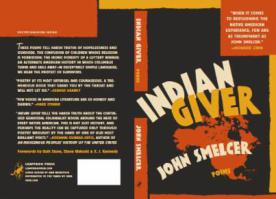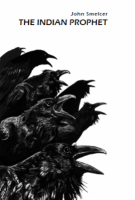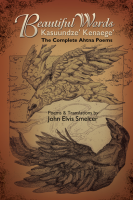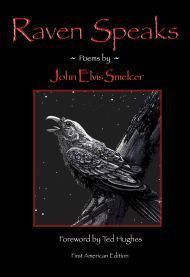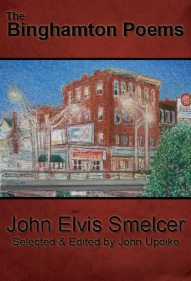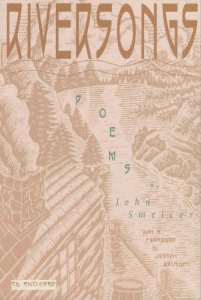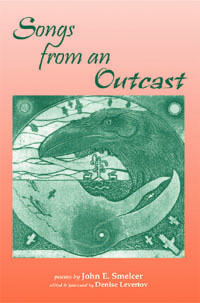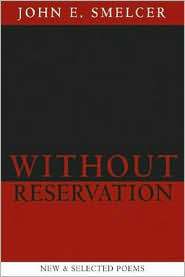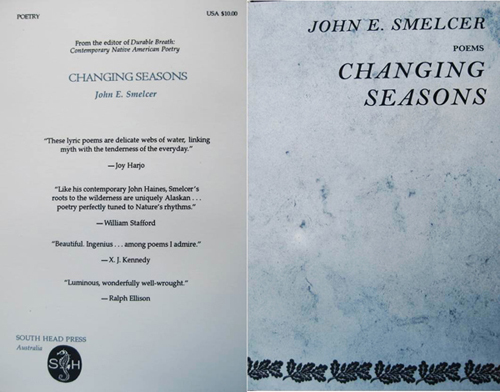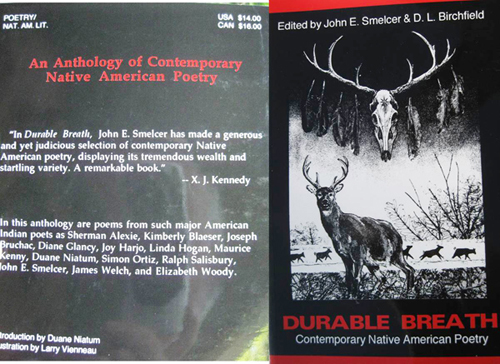JOHN SMELCER'S POETRY BOOKS
SELECTED PRAISE FROM THE BOOK COVERS
"John Smelcer is among the most brilliant younger poets in recent American literature." Allen Ginsberg (from Songs from an
Outcast)
"A skilled and worthy poet, one of our best. Few people can afford not to have his writing in their library." Denise Levertov (from Songs from an
Outcast)
"This poet speaks for the land and for the people who belong to it." Ursula K. Le Guin (from Songs from an Outcast)
"The lovely poems that John Smelcer has collected, and careful linguistic work on Ahtna, will reveal that someone remembers, and will allow others too to know existence and to marvel
in it." Noam Chomsky (from The Complete Ahtna Poems)
"Included in the sum is the history of who we are and who we were. John Smelcer's bilingual poems and his two dictionaries of endangered Native languages are a priceless gift to
posterity." Steven Pinker (from The Complete Ahtna Poems)
"John Smelcer gives us hope that poetry and its precise and symbolic language can save us." Maria Gillan, winner of the American Book Award (from The Binghamton
Poems)
"I would argue--and rightly so--that John Smelcer is among the best poets of his generation." Stanley Kunitz, winner of the Pulitzer Prize & Poet Laureate of
America
"[Smelcer's] poems teaches us that poetry is necessary." John Updike (from The Binghamton Poems)
"Poems with a sweet clarity that leaves us with no excuse. To be taken straight." Gary Snyder, winner of the Pulitzer Prize (from Without
Reservation)
"John Smelcer is a very considerable American poet, an astute observer of our contemporary scene."
X. J. Kennedy (from Without Reservation)
"What impresses me most about John Smelcer, aside from his powerful writing, is his tenacity—his indomitable spirit. He has never given up; he has never let others quiet his voice. He
continues to write and the world continues to listen to what he has to say." James Welch, Fools Crow, The Indian Lawyer,
Winter in the Blood (from Indian Giver)
"No other American poet carries such a heavy cultural burden." Carl Sagan (from Riversongs)
"Luminous, wonderfully well wrought." Ralph Ellison, author of The Invisible Man (from Changing Seasons)
"[Smelcer's] lyric poems are delicate webs of water, linking myth with the tenderness of the everyday."
Joy Harjo (from Changing Seasons)
New Release Spring 2016
Written over two decades, a masterpiece of American literature.
"Poetry at its most satirical and courageous. A tremendous book." Seamus Heaney
"Few voices in American literature are so honest and daring." Mark Strand
"An astute and intelligent exploration of what it means to be Native American in the 21st century."
Maria Gillan, winner of the American Book Award
"What impresses me most about John Smelcer, aside from his powerful writing, is his tenacity—his indomitable spirit. He has never given up; he has never let others quiet his voice. He continues to
write and the world continues to listen to what he has to say." James Welch, author of Fools Crow, The Indian Lawyer, Winter in the Blood
James Welch (Blackfeet) was one of the most influential writers of the American Indian Literary Renaissance, receiving the American Book Award for his novel, Fools Crow. He was a mentor to
emerging Native writers like John Smelcer and Sherman Alexie.
"Smelcer's deceptively direct poems have the kind of energy found in the poems of William Carlos Williams and Gary Snyder." Joseph Bruchac
"John Smelcer is one of the best Native American writers." Lee Francis
Lee Francis (Laguna Pueblo-Anishinaabe) was the founder of Wordcraft Circle of Native Writers & Storytellers, of which John Smelcer was a founding member. Lee's sister was Paula Gunn Allen, one
of the foremost Native writers and scholars of the 20th century.
"Nothing short of splendid. Like an alley fight fought on the petals of a rose." Robert Nazarene, Ed. Margie
"Reminiscent of Edgar Lee Master's Spoon River Anthology, Indian Giver is the most important poetry book to come out of America in years." Aeronwy Thomas (Dylan Thomas's
daughter)
"Among the best and most original poets in America." Stanley Kunitz, U.S. Poet Laureate
"So many lines and images stay with me... A striking and beautiful book." Lyn Lifshin
"The kind of energy found in the poems of William Carlos Williams and Gary Snyder." Joseph Bruchac
"Angry, honest, proud...The huge range of poems gathered here create a lament, a protest, and an inextinguishable song." Sherod Santos
"Daring, brilliant, and absolutely defiant! John's Smelcer's poetry is genius." Ruth Stone, winner of the National Book Award
"[John Smelcer] sings to the cosmos, as Whitman might say. And his words are simple and good. They bring light." Diane Wakoski
"I'm amazed that so angry a book can be so sharp of eye and can bestow such pleasure." X.J. Kennedy,
Ed. Literature, An Introduction to Poetry, The Bedford Reader
"There are many writers I love, living and dead, published and performers, and very rarely I discover a voice that makes me breathe like I just came up from deep water. John Smelcer is that voice.
Where we have become resigned to various degrees of lies, Smelcer's truths are like pure oxygen. The screen has been pulled over our eyes for a long time, and Smelcer tears gaping holes in it,
exposing the hard, bare, wonderful, heart-running truth." amazon.com
"[This] is history from the side omitted from school textbooks. John Smelcer is just one voice among millions of Native Americans. His is a well-honed voice, however. There's much to be gained from
listening to him." Anchorage Dispatch News
"Smelcer is a renowned activist for the Ahtna community in Alaska and the only member of his tribe fluent in reading and writing its Native language. Smelcer’s work is devoted to the double
convictions of writing against mainstream culture from a Native American perspective and refuting the stereotypes of old westerns. As he reminds readers in one poem, “Not all Indians ride horses.”
Smelcer takes pleasure in these deceptively simple points of clarification and offers humorous commentary on historical documents, such as a “Template for Treaties between the United States of
America and Indian Tribes” and an abandoned draft of the Constitution. Smelcer revels in the absurdity of “legal” claims to Native land, and his work rides into darkly cynical territory in poems like
“Indian Scalper,” in which Jessie BlackHawk sells tickets outside a Redskins game, and “Recipe for a Reztini,” which includes two shots of cheap gin and a drive around Dead Man’s Curve. A poignant,
discomforting, necessary collection." Booklist
"Smelcer's poetry is a lot like looking at an album of cleverly arranged photos. They record images of their characters' lives, some painful, sharply focused, brightly illuminated in truth, other are
blurry and a little out of focus or crooked. Some are framed oddly, missing a head, foot or an arm, reflecting the uncertainty of the subject and the poet who tries to capture it. Regardless of their
subject, they all represent the truths of someone navigating the minefield between two cultures. Finally, there is an accuracy of place in his works that I can personally verify, like the cold wind
off the glacial silt-grey Copper River. Or a drive down the rutted Herbert Smelcer Avenue to the family's BIA land allotment and fish camp, or feeling like a trespasser standing at the picket fenced
graveyard he mentions in his poem "Riversong." Smelcer's poems are for the taking, and he doesn't want them back. They're ours to keep with their satire, outrageously dark humor, and healing doses of
pain. It's up to us to decide to own them or not." Reviewer's Choice, Midwest Book Review
"[Smelcer's] poems challenge readers to rethink American history, contemporary social issues, and identity politics. They will make you feel and think about the world we share in new and, perhaps,
challenging ways. As X.J. Kennedy writes in his foreword, “Reading it, I often felt torn between an impulse to laugh and a painful sense of compassion, which is how I respond to the greatest
literature, from King Lear to War and Peace (19).” This is great literature that will speak to anyone who thinks deeply and cares passionately about social problems and injustice
stemming from globalization, anyone who mourns the loss of cultural traditions...anyone who understands the loneliness of (not quite) belonging to two worlds." amazon.com
"I've been to John's cabin in Tazlina Village. I've met his Indian relatives, seen the poverty and disillusion, the natural beauty. About John's writing I can say this: The depth, sincerity, and
urgency of Smelcer's unique and bipolar vision is not the short-term profiteering of a Kevin Costner, but the product of a life tortured and graced by a celebration of American existence, a
comprehension of grand achievement and irretrievable loss." Bard Young, Ed. Cumberland Poetry Review
Click on Bio to learn more about John Smelcer's tribal affiliation
NEW! Spring 2012
THE INDIAN PROPHET
From Cross-Cultural Communications Press, celebrating over 40 years of publishing!
John Smelcer's bilingual poetry book, The Indian Prophet, is finally available in print after years in the works and includes original artwork by
long-time collaborator, Larry Vienneau. Nominated for the XXXVIII Pushcart Prize.
Order now! www.cross-culturalcommunications.com
BEAUTIFUL WORDS: THE COMPLETE AHTNA POEMS
A literary landmark. The only literature in this endangered language extant.
Forewords by Noam Chomsky and Steven Pinker
"Rescuing a language that faces oblivion is a remarkable achievement. We can only hope that such achievement will inspire others to follow in the same path." Noam Chomsky
"Included in the sum is the history of who we are and who we were. John Smelcer's bilingual poems and his two dictionaries of endangered Native languages are a priceless gift to posterity." Steven
Pinker, author of The Language Instinct
RAVEN SPEAKS
Originally published in England in 1997 by England's Poet Laureate, Ted Hughes
THE BINGHAMTON POEMS
Book's Origin: John Smelcer's tenth book of poetry, The Binghamton Poems (102 pages), is a collection of poetry written from the fall of 2006 until fall 2008. The poems were personally
selected and edited by Pulitzer Prize winner John Updike, who co-judged the National Poetry Book award with Smelcer in the mid-1990s. American Book Award winner Maria Mazzioti Gillan provided
the foreword.
"Some say poetry is cathartic. Reading these poems teaches us that poetry is necessary." John Updike
"Smelcer's book gives us hope that poetry and its precise and symbolic language can save us." Maria Gillan, winner of the American Book Award
RIVERSONGS (foreword by Joseph Bruchac)
Cumberland Poetry Review (2003)
Winner of the Robert Warren Penn Poetry Prize
(UCLA’s American Indian Studies Center, 2000)
Details: Selected and edited and with a foreword by Denise Levertov /Foreword to the bilingual poems by X. J. Kennedy. In the poems, some written in the Ahtna language and then rendered into memorable English, John Smelcer conveys a strong sense of his heritage, what poet Denise Levertov calls "his constant haunting awareness of indigenous life so grievously wounded yet still alive." Smelcer speaks from the Alaskan landscape, for the land, and for the people that belong to it. Smelcer has steeped himself and his poetry in his Ahtna traditions of language and ritual. As a result, his writing, with remarkable strength, succeeds in bridging his Native and English worlds. No library should be without this book.”
WITHOUT RESERVATION
Truman State University Press, 2003
"A compelling voice, unforgettable and highly recommended." Library Bookwatch
"These lyric poems are delicate webs of water, linking myth with the tenderness of the everyday." Joy Harjo
"Luminous, wonderfully well-wrought." Ralph Ellison, author of The Invisible Man

